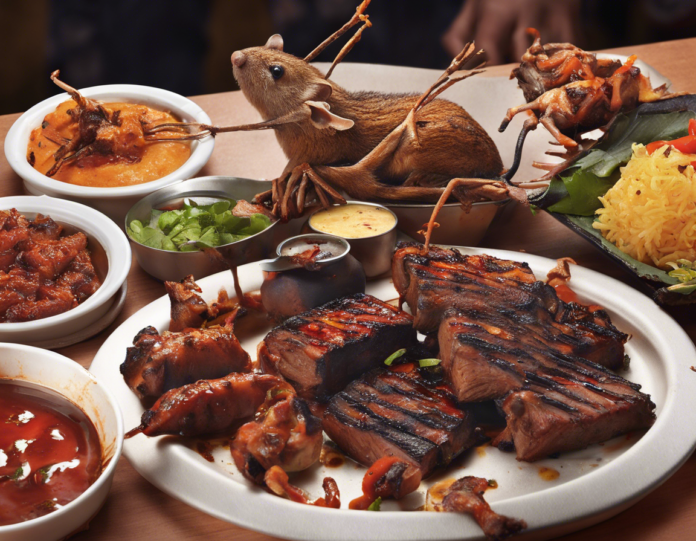Introduction
Recently, a shocking incident took place at the popular restaurant chain Barbeque Nation, where a customer found a dead mouse in their meal. This incident has raised serious concerns about food safety and hygiene practices in the restaurant industry. In this article, we will delve into the details of the incident, discuss the implications for the restaurant, and provide insights into how such incidents can be prevented in the future.
The Incident
The incident took place at a Barbeque Nation outlet in City X, where a customer made a horrifying discovery while enjoying their meal. As they were about to bite into a piece of meat, they noticed a small, lifeless creature mixed in with the food on their plate. Shocked and disgusted, the customer immediately alerted the restaurant staff, who were equally surprised and apologetic about the situation.
Implications for Barbeque Nation
This incident has sparked outrage among customers and the general public, raising questions about the overall cleanliness and hygiene standards maintained by Barbeque Nation. The restaurant chain, known for its popular barbeque buffets and dining experience, now faces a major reputation crisis that could significantly impact its customer base and revenue.
Food Safety and Hygiene Practices
Ensuring food safety and maintaining high levels of hygiene are crucial aspects of running a successful restaurant business. Stringent measures need to be in place to prevent incidents like the dead mouse in food from occurring. Here are some key practices that restaurants, including Barbeque Nation, should implement:
1. Regular Pest Control Inspections: Restaurants should conduct routine pest control inspections to identify and address any infestations promptly. This includes measures to prevent rodents, insects, and other pests from entering the premises.
2. Employee Training: Proper training should be provided to restaurant staff on food handling, cleanliness, and hygiene practices. Employees should be aware of the importance of maintaining a clean and safe environment in the kitchen and dining areas.
3. Quality Assurance Checks: Regular quality assurance checks should be conducted on ingredients, supplies, and final food preparations to ensure that only fresh and safe items are being served to customers.
4. Hygiene Protocols: Implementing strict hygiene protocols, such as handwashing, sanitization of utensils and equipment, and proper storage of food items, is essential to prevent contamination and foodborne illnesses.
5. Customer Feedback Mechanism: Restaurants should have a reliable mechanism in place for customers to provide feedback on their dining experience. This can help identify any issues promptly and take corrective actions.
Preventing Future Incidents
To prevent future incidents like the dead mouse in food at Barbeque Nation, the restaurant and others in the industry should take the following steps:
- Implement enhanced pest control measures, including regular inspections and sealing of entry points.
- Conduct thorough staff training on food safety, hygiene practices, and pest control procedures.
- Strengthen quality assurance checks on ingredients and final food preparations.
- Increase awareness among employees about the importance of cleanliness and hygiene in the workplace.
- Establish a zero-tolerance policy towards lapses in food safety and hygiene.
FAQs
1. How can customers ensure food safety when dining out?
Customers can look out for hygiene ratings, cleanliness of the restaurant, and the overall dining environment. They can also ask the staff about the restaurant’s food safety practices.
2. What should customers do if they find a foreign object in their food at a restaurant?
Customers should immediately inform the restaurant staff and the management about the incident. It is essential to document the incident and seek a resolution from the restaurant.
3. What are the common causes of contamination in restaurant food?
Contamination can occur due to poor hygiene practices, improper food storage, cross-contamination, and pest infestations in the kitchen or storage areas.
4. How can restaurants maintain high standards of food safety and hygiene?
Restaurants can achieve this by implementing strict protocols for cleanliness, regular training for staff, quality assurance checks, pest control measures, and customer feedback mechanisms.
5. Is it common to find foreign objects in restaurant food?
While it is rare, incidents like finding foreign objects in restaurant food can occur due to lapses in food safety practices. Restaurants must take proactive steps to prevent such occurrences.
Conclusion
The incident of a dead mouse in food at Barbeque Nation serves as a reminder of the critical importance of food safety and hygiene in the restaurant industry. By implementing robust measures to prevent contamination, conducting regular inspections, and prioritizing cleanliness, restaurants can maintain the trust and confidence of their customers. It is essential for both restaurants and customers to be vigilant and proactive in ensuring a safe and enjoyable dining experience for everyone.








